
PEITEL PTCarPhone 6 Instruction Manual
Precautionary Measures during Installation
 CAUTION:
CAUTION:
Non-compliance with these instructions can cause damage to the device and to the vehicle.
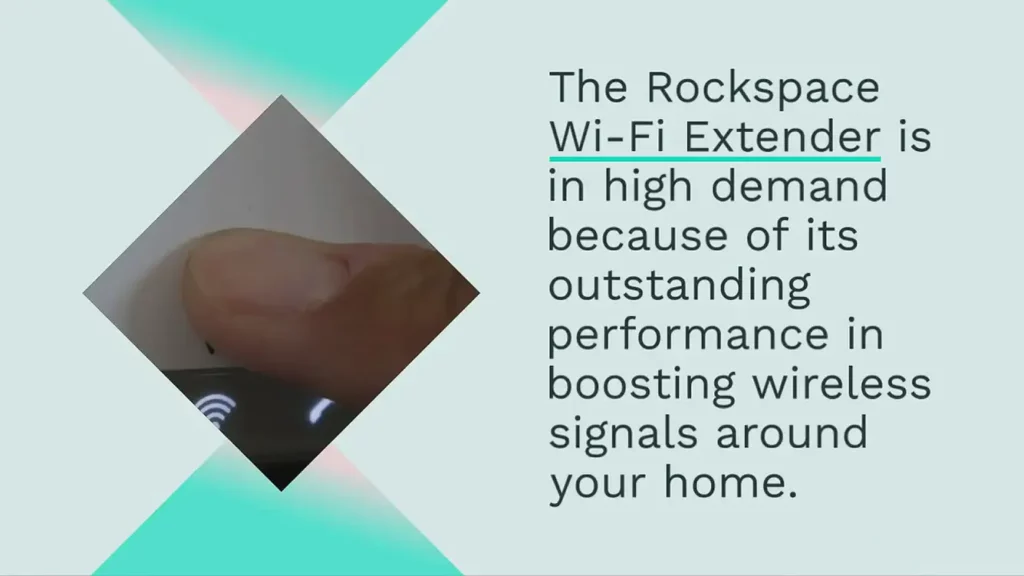 Qualified installation personnel
Qualified installation personnel
The device must only be installed in the vehicle and serviced by qualified specialists.
 Airbag
Airbag
With vehicles that are equipped with an airbag, remember that the airbag fills with a strong force. Do not install any components in the area impacted by the filled airbag.
 Antennas
Antennas
Before start-up of the device, all antennas (2x LTE, 1x WiFi, 1x GPS) must be connected. The device must not be operated without antenna(s), since this can lead to the destruction of the device.
 Connection to the power supply of the vehicle In some cases settings must be done in modern vehicles after attaching the battery. Absolutely
Connection to the power supply of the vehicle In some cases settings must be done in modern vehicles after attaching the battery. Absolutely
be sure to refer to the operating manual of your vehicle for this.
 Environmental influences: Water and dust
Environmental influences: Water and dust
The PTCarPhone and all accessories are neither dustproof nor waterproof. Make sure that the PTCarPhone is always protected from moisture and from water penetrating the vehicle. Prevent
penetration of dust particles in the housing by cleaning regularly.
 More information is available in “User Manual PTCarPhone 6 Series” at: www.peitel.de
More information is available in “User Manual PTCarPhone 6 Series” at: www.peitel.de
Imprint
© 2020 pei tel Communications GmbH. All rights reserved. pei tel Communications GmbH, Rheinstraße 15 A, 14513 Teltow, Germany
pei tel reserves the right to modify these instructions at any time, to correct typing mistakes or to add new functions
in the course of technical progress or further development. Every current version of these instructions can be found on the Internet at www.peitel.de.
Legal notices
pei tel accepts no liability for maintaining settings, data or text messages saved on the PTCarPhone. Some of the services, company names and trademarks given in these instructions are the property of the respective trademark owners.
Connection Diagram

Assembly
Assembly Sequence
- Become familiar with the connections. Disconnect the negative terminal of the vehicle battery while following the safety instructions of the vehicle manufacturer.
- Select the installation locations for the electronics box, handset, loudspeaker, handsfree microphone and the antenna(s), paying attention to the cable lengths and installation
instructions and mount the components. When drilling holes make sure that the vehicle is not damaged. Use cable bushings on sharp-edged holes. - Install the included hands-free microphone. Make sure that air fl ow from the vents is not in the direction of the microphone. Also refer to “Mounting locations for the microphone”
below. Then install the loudspeaker (a good location is the passenger footwell). During installation of the microphone and loudspeaker make sure of suffi ciently large spatial separation, to avoid acoustic feedback. - Connect the power supply cable (red) on the permanent positive and the ignition input (yellow/ black) to the ignition *, if present. Do not connect the ignition input (yellow/black) onto
permanent positive, since this limits the scope of function of the device. Connection of the ground cable is done directly to the vehicle battery, the central ground point (ground block) or a part of the vehicle body. * For vehicles without ignition wiring it is recommended at the end of the installation to activate the “Virtual ignition” function. - Connect the violet cable with the mute input of the car radio. This ensures automatic radio mute switching for incoming and outgoing calls.
- Insulate unused cables so no short circuits can occur.
- Connect the individual components of the device with each other using the plug and screw connections (see connection diagram).
- Check the total installation and insert a valid SIM card. Connect the vehicle battery.
- For vehicles with ignition wiring: Turn on the ignition. The device now turns on and requests the input of the PIN (if this was not deactivated on the SIM card). For vehicles without ignition wiring: Turn the device on with the end key / on the handset
- Enter the PIN. The telephone is now registered in the network.
- Make a call in order to check the basic functions.
- Check whether there is new software available and if necessary perform a software update. Downloading of software updates can incur costs, depending on the mobile phone contract.
- If desired, make personal settings on the device (see chapter “Setting up the PTCarPhone” on the back) and fi nish the installation.
Mounting location for the microphone

Microphone alignment
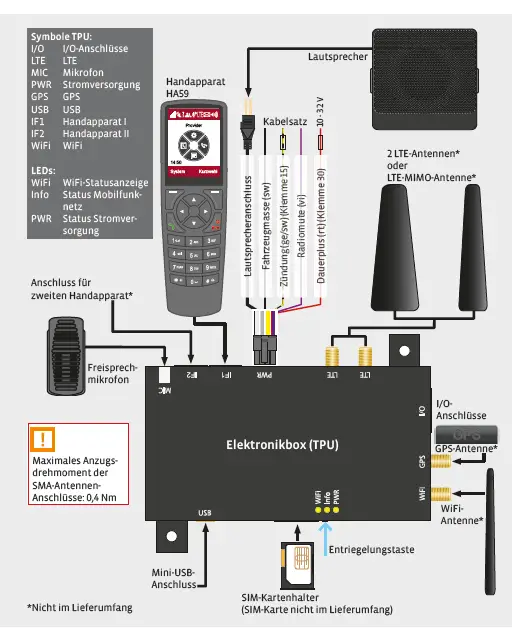
- Maximum sensitivity
- Adhesive tape for smooth (fl at) surfaces
Setup
Inserting the SIM card
A valid and activated SIM card is required to operate the device. This is available from your mobile phone provider. It saves all the important data of your connection.
To open the SIM card holder, push the round button in the housing with a pointed object. Place the SIM card in the holder and push it back in the electronics box.
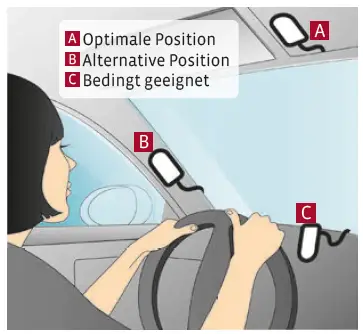
NOTE:
- Insert the SIM card only if the device and the vehicle ignition are turned off.
- Make sure to insert the SIM card holder in the correct position. Closing does not require strong force.
- If a piece of plastic remains on the edge of the SIM card when taking it out, it is necessary to remove this before inserting the SIM card.
Inputting PIN
If a PIN is required it will be requested with an appropriate message when starting the device. Enter the PIN using the input keys and
confirm with the OK function key. Corrections can be made with the Delete function key. PIN input is shown with asterisks so that it cannot be seen. The subsequent
registration in the network can take a few seconds. After entering an incorrect PIN three times the SIM card is blocked. The PUK is requested for unblocking.
Setting the delay time
After turning off the ignition the device runs for the set delay time and then turns off. Use the following menu path to set the delay time:
System > Configuration > device code input > Delay timer The device code at delivery is: 0000
Software update
Software updates for the handset and PTCar- Phone are done via the Internet access of the mobile network. Therefore, Internet access must
be set up beforehand. System > Device info > Update > device code input > Update process The device code at delivery is: 0000
Turning on virtual ignition
In modern vehicles without ignition wiring it is recommended to activate the Virtual ignition function. System > Configuration > device code input > Virtual ignition
The device code at delivery is: 0000
WiFi Activation
System > Configuration > device code input > WiFi The device code at delivery is: 0000
Technical details
I/O connections he TPU has six freely programmable inputs and outputs:
- Model: Open-Drain output (wired ground) with recovery diode / input with 15 kOhm pull-up resistor against the device operating voltage
- Only ohmic and inductive loads are allowed (no capacitive loads!)
- Maximum current carrying capacity: 100 mA per connection
- Dielectric strength smaller than/equal to the connected device operating voltage (however, max. 32 V)
- Recovery diode for relay (inductive loads) included; use of device-specific power supply (pins 4, 5, 6) is required for this

I/O connections (Top view)
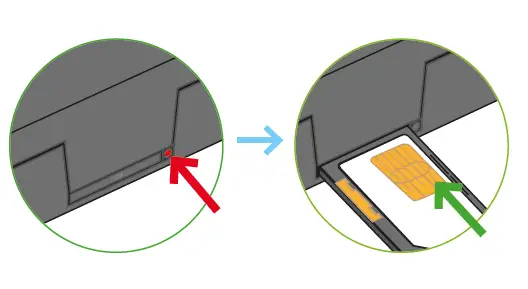

The respective operating voltage of the vehicle electrical system is applied to the I/O connection. Please keep this in mind when selecting your I/O components.
Types of connection:
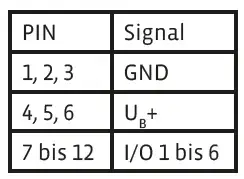
NOTICE:
The “I/O connections manual” is available at: www.peitel.de
Cable set connection

Cable set connection (Top view)
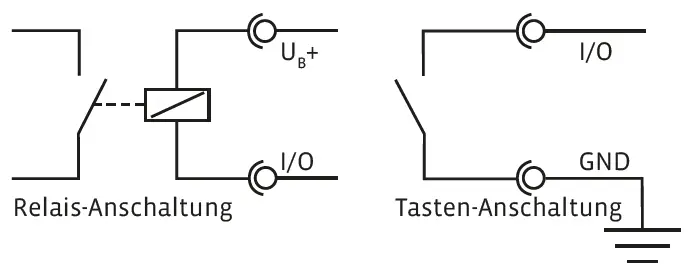
Abbreviations
UB+: Operating voltage PTCarPhone
GND: Vehicle ground (minus terminal)
I/O: Switch input/switch output
LSPK: Loudspeaker connection
TPU: TelePhoneUnit
blk: black
gy: gray
rd: red
wht: white
yl/blk: yellow/black
vi: violet
Radio mute output
- Model: Open-Drain output (wired ground)
- Only ohmic loads allowed!
- Maximum current carrying capacity: 50 mA
- Maximum dielectric strength against ground: +32 V
Hardware Info ENGLISH
Scope of supply
- Electronics box (TPU)
- Handset HA59 with cradle
- Loudspeaker
- Hands-free microphone
- 2.5 m extension cable for handset
- Cable set
- Quick reference guide
- Installation instructions
Available accessories
- Handset HA59 incl. 5.0 m extension cable Article number: 6508-006-100-51
- I/O cable installation set (12x 200 mm strands and plug housing) Article number: 6708-004-000-00
- 2.5 m extension cable for the handset Article number: 6098-260-005-51
- 5.0 m extension cable for the handset Article number: 6098-260-007-51
Additional required hardware
LTE antenna
Two LTE antennas or a LTE MIMO antenna with
SMA connector (not in scope of supply).
GPS antenna
GPS antenna with SMA connector (not in scope of supply).
Power supply: 3.3 V, max. 50 mA;
WiFi antenna
WiFi antenna with SMA connector (not in scope
of supply).
Recommended Antennas
- LTE: Hirschmann Magnetic Mount Antenna CEL 70 26 RD M/SMA/2.5 (Order No. US: HCELMX- 0150A-02, Order No. EU: 955 006-002), cable length 2500 mm
- GPS: Taoglas Titan GPS/GALILEO Antenna AA.105 (Order No. AA.105.301111), Cable length 3000 mm
- WiFi: Proant Ex-It 2400 28 SMA (Order No. PROEX- 347), no cable
SIM card
Mini SIM card with mobile phone contract with phone and data plan, supporting SMS, LTE and VoLTE. This is available from your mobile phone provider. A data tariff is necessary for the use of the regular and necessary software updates as well as the use of the online platform “Bridge”.

- If the PTCarPhone should be operated with the same telephone number as the mobile phone of the user, it is recommended to use a so-called multi-SIM card. For this, contact your mobile phone provider.
- It is recommended to make sure before assembly, whether the electronics box should be positioned so that easy access to the SIM card is provided.
Screws, adhesive tape and mounts
Depending on the installation situation it can be necessary to fasten the electronics box, the handset and the accessories with divers fastening materials.
Please do not forget: Safety first! Nevertheless, it is recommended to pay attention to aesthetics.